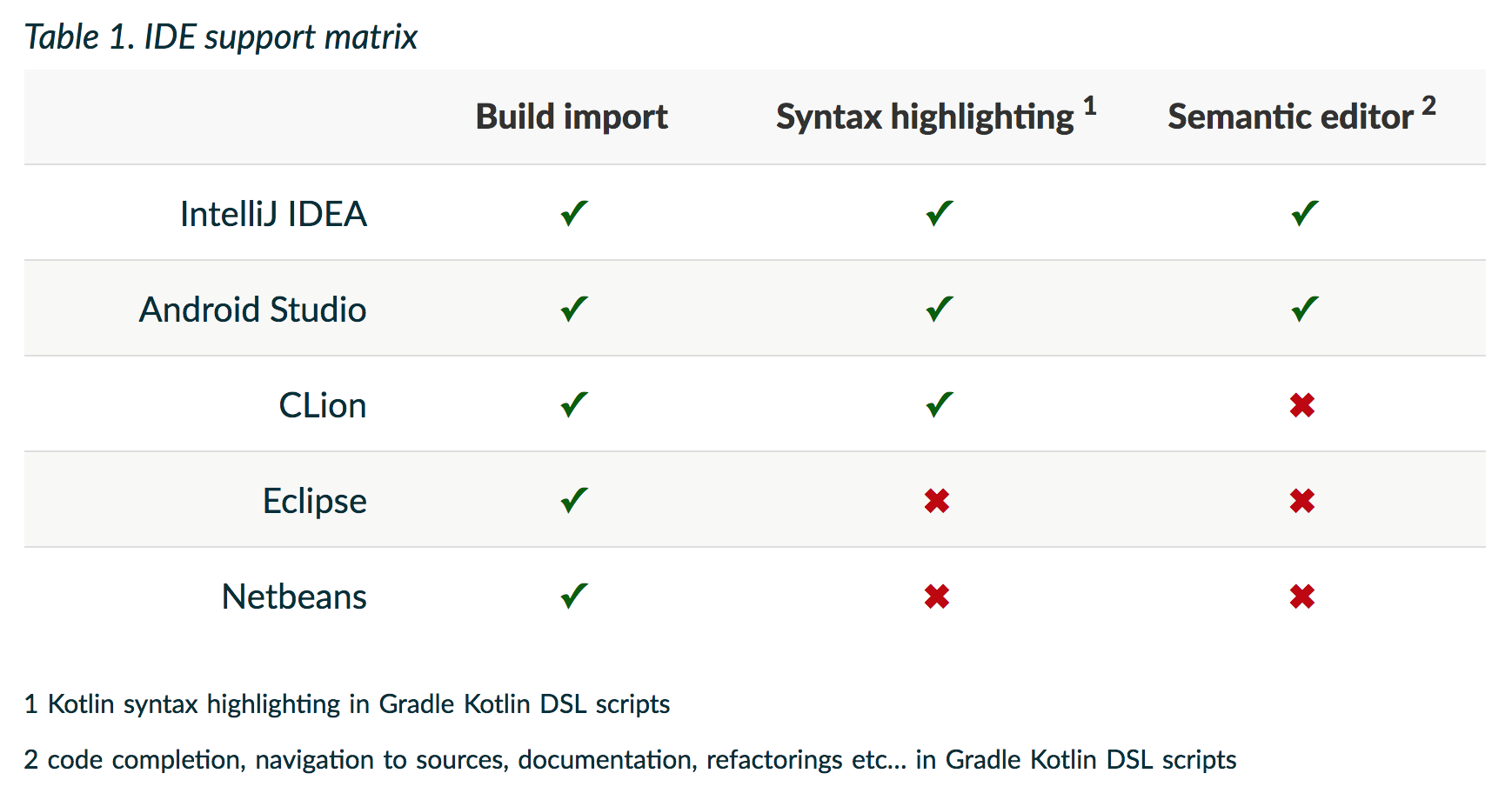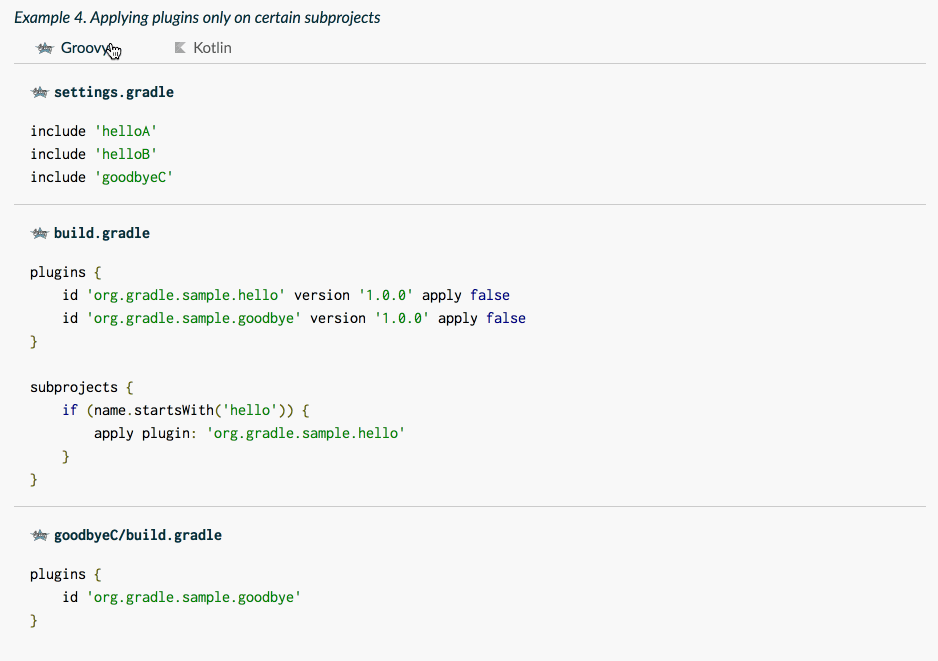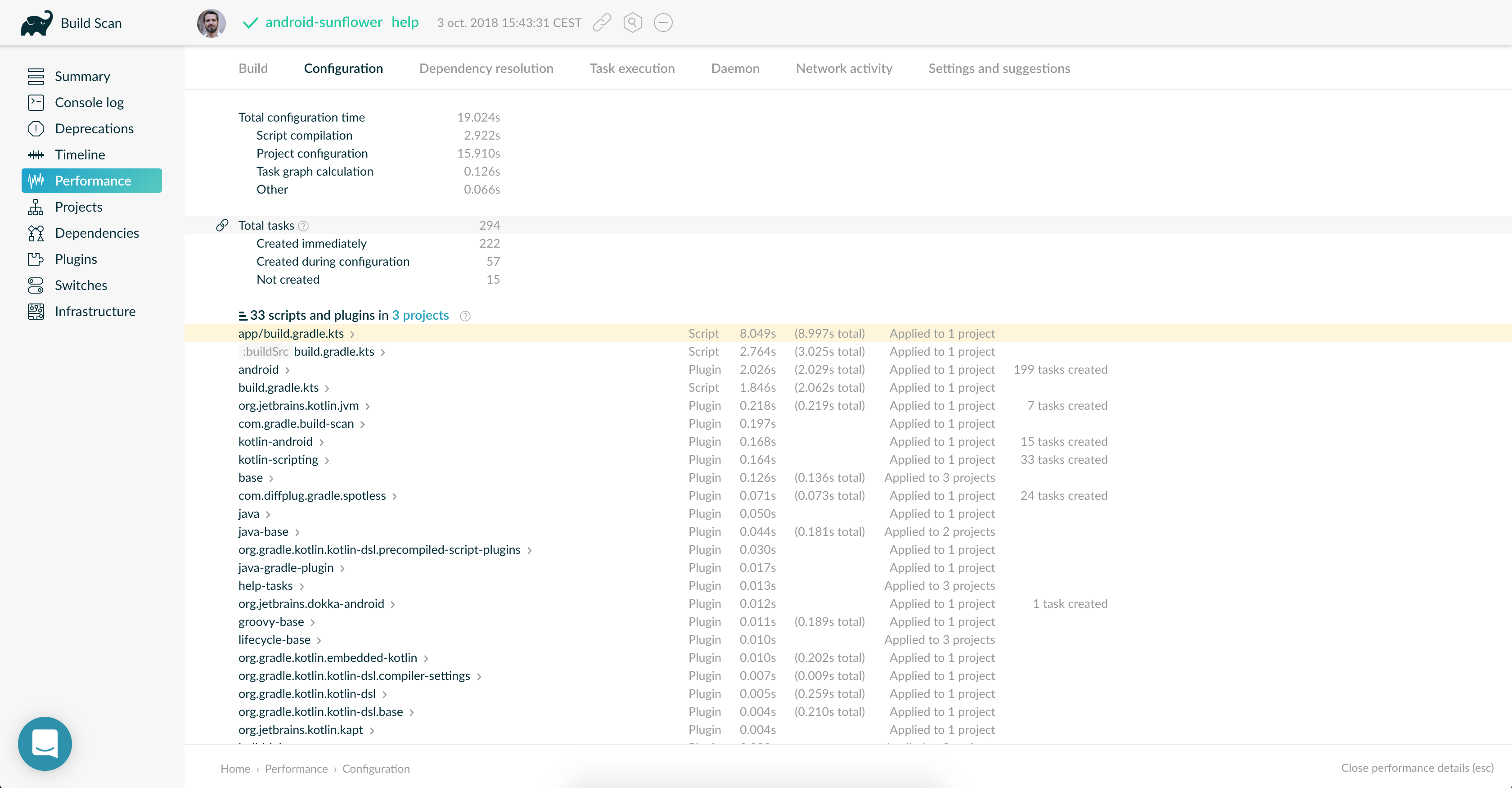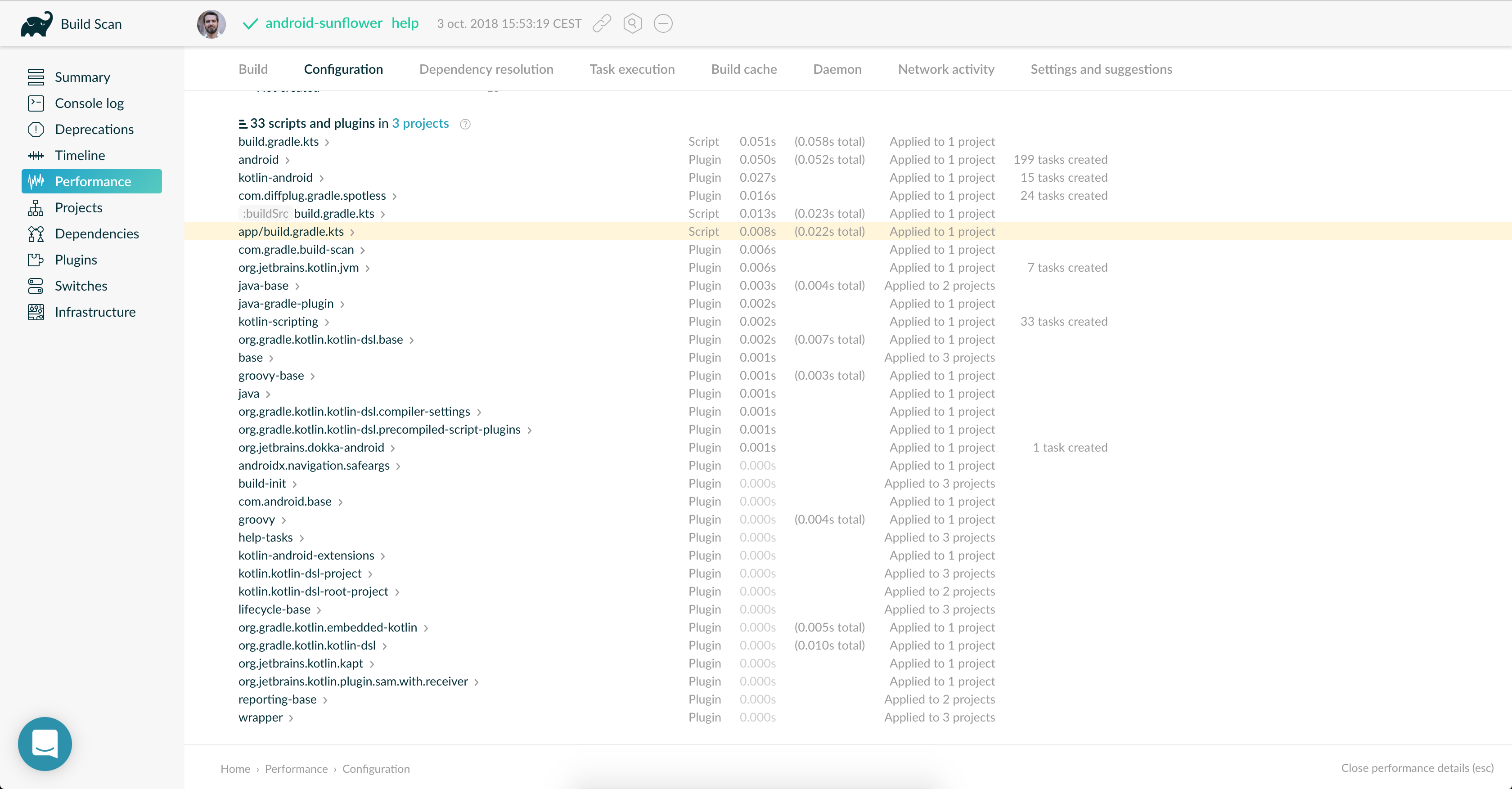myCustomSourceGenerator {
enable("Kotlin", "Java")
}
integrationTests {
db {
jdbcUrl = "…"
}
legacy {
}
}Type safe build logic with the Gradle Kotlin DSL
Hans Dockter & Paul Merlin - KotlinConf 2018
Introduction
Declarative builds with custom models
Declarative elements describe the “what”
The underlying logic creates the “how”
Groovy provided an extensible DSL language
Lack of tooling support
Hoped that ecosystem will eventually provide a solution
Underestimated the negative impact
Models hard to configure for developers
Models hard to refactor and evolve for build authors
A lot of non-idiomatic Gradle code because of this
Kotlin is the missing link

Who am I
speaker {
name = "Paul Merlin"
company = "Gradle"
oss = "Apache Polygene PMC, former chair",
successes = listOf(
"BASIC 'Hello, World!' in 1986",
"C 'Hello, World!' in 1989",
"Java 'Hello, World!' in 1996"
"Kotlin 'Hello, World!' in 2015",
"tools", "daemons", "apps", "frameworks", "libs"
),
failures = generateSequence(code) { bugs },
twitter = "@eskat0s",
github = "eskatos"
}Agenda
Gradle Build Tool in a nutshell
Type-safe build logic
What makes this possible?
Migrating from Groovy scripts
Taking a step back
Performance
Wrapping up
What is Gradle?
Gradle’s purpose
Gradle Build Tool is a build and automation tool
JVM based
Implemented in Java
100% Free Open Source - Apache Standard License 2.0
Agnostic Build System
JVM ecosystem
Java, Kotlin, Groovy, Scala, Clojure …
Native ecosystem
C, C++, Swift, …
Android
Misc
Go, Python, JavaScript, Asciidoctor, …
Gradle in figures
> 6M downloads / month
#17 OSS projects worldwide says TechCrunch
35+ Gradle Engineers
300K builds/week @ LinkedIn
Gradle Inc.
The company behind Gradle
Gradle Build Tool - gradle.org
Gradle Enterprise (Build Scans and Build Cache) - gradle.com
(Gradle consulting, support, development services etc.)
(Training: online, public and in-house)
Gradle is hiring!
Fully distributed development team
Exciting project used by millions
Build Tool team and Gradle Enterprise positions
If anything you hear from now on sounds like a great problem to solve,
Talk to us!
gradle.com/careers
Gradle Build Tool in a nutshell
Gradle Build Tool in a nutshell
Groovy and Kotlin build scripts
Task configuration and execution
Dependency resolution
Work avoidance

Gradle Plugins
Core Plugins (
java,jacoco,maven-publish…)Community Plugins (
kotlin,android,golang,pygradle,asciidoctor…)

Gradle Plugins
Gradle Plugins contribute
reusable and configurable Gradle Tasks
configurable Gradle Extensions

Gradle Plugins
Gradle Plugins contribute a model to configure
in build scripts
using a DSL

A Java library
plugins {
`java-library`
}
dependencies {
api("com.acme:foo:1.0")
implementation("com.zoo:monkey:1.1")
}
tasks.withType<JavaCompile> {
// ...
}A native app
plugins {
`cpp-application`
}
application {
baseName = "my-app"
}
toolChains {
// ...
}Type-safe build logic
Why type-safe build logic?
Developer experience
Authoring build logic
Troubleshooting build issues
IDE Support
Less surprises at runtime
shorter feedback loop
avoid the performance impact of dynamism
Gradle meets Kotlin
Kotlin, the language
Type safety & null safety
Great tooling and IDE support
The Gradle Kotlin DSL

gradle.org/kotlin
Uniting a dynamic configuration model and a statically typed language
Type-safe build logic
Demonstration
github.com/eskatos/kotlinconf18-greetings
What did we just see?
A build whose logic is entirely written in Kotlin
Type safety, null safety
API and model discoverability
Documentation and navigation to sources
Refactorings
What makes all this possible?
The Gradle build model
Gradle Plugins contribute reusable and configurable models
This is a dynamic model
The Gradle Kotlin DSL provides a static view over that model
.kt vs .kts vs .gradle.kts
they all contain Kotlin code
.ktfiles are assumed to be compiled by the kotlin compiler.ktsfiles are assumed to be executed by the kotlin scripting support.gradle.ktsfiles are assumed to be hosted by Gradle
.gradle.kts
Gradle Kotlin DSL in the classpath
Script compilation dependencies coming from Gradle
Implicit imports
Custom tailored IDE script editor support
IDE support

The Gradle Kotlin DSL sugar
Kotlin friendly extensions of the Gradle API
KClass<T>,reified<T>()Delegated properties for Gradle properties and collections
Dynamically generated Kotlin extensions
for model elements contributed by plugins (configurations, extensions, tasks etc…)
calculated right before evaluating the script body
Interoperability utilities
Migrating from Groovy
Migrating from Groovy
Demonstration
github.com/eskatos/android-sunflower
What benefits?
Type-safety
Discoverability
Documentation and navigation
Refactorings
Shared functions
Just like shared declarations (e.g. dependencies)
Don’t use extra properties
Move them to
buildSrcGet IDE support
Interoperability
Gradle Plugins may
expose untyped Groovy
Closuretaking functionsrely on more Groovy dynamism
e.g. Dokka required the use of
delegateClosureOf<T> {}existing fix will go in the next release
Interoperability
closureOf<T> {}anddelegateClosureOf<T> {}withGroovyBuilder {}apply(from = "some-groovy-script.gradle")Covered in detail in the Gradle user manual
Migration strategies
Kotlin and Groovy build logic can coexist
mechanical step by step migration possible
migrating doesn’t block your team
Prepare your build to make it easier to migrate
by making your Groovy scripts closer to Kotlin
unify quotes, disambiguate properties/functions …
by applying Gradle fundamentals and best practices
use
buildSrcandplugins {}etc…
Let Kotlin logic drive Groovy logic
not the other way around
Resources for migration
Migration guide available at guides.gradle.org
Gradle user manual available at docs.gradle.org
both Groovy/Kotlin snippets
best place to learn how to do what with each DSL, and compare
Groovy and Kotlin samples

Script Plugins
A script plugin is a
.gradle(.kts)scriptApplied from another one
apply(from = "some.gradle.kts")
Do not support the
plugins {}block, yetCovered in detail in the Gradle user manual
Precompiled script plugins
Same as script plugins
Compiled as part of a Kotlin source set
Can be used in
buildSrcCan be used in binary plugins
Covered in detail in the Gradle user manual
Taking a step back
Organize build logic
buildSrcGradle Plugins, Gradle Plugins, Gradle Plugins
plugins {},plugins {},plugins {}Basically, apply Gradle fundamentals and best practices
Profit
Authoring type-safe plugins
Plugins contribute to the DSL
They should do so in a type-safe manner
Don’t expose
groovy.lang.Closure<*>taking methodsUse explicit types instead, like
Action<T>If written in Kotlin, prefer
Action<T>over Kotlin lambdas
Again, apply Gradle fundamentals and best practices
Gradle Kotlin DSL performance
Gradle Kotlin DSL performance
Gradle configuration phase
Configuring your build when nothing has changed takes more than a second?
Make sure to check out the Gradle Performance Guide
We can help you pinpoints bottlenecks at https://github.com/gradle/gradle/issues/1628
In comparison with the Gradle Groovy DSL
Gradle Kotlin DSL vs. Groovy DSL
when nothing has changed
Similar performance characteristics for most builds
~100ms gap on a large build with 500 sub projects
~2ms hit per project in that scenario, ymmv

Gradle Kotlin DSL vs. Groovy DSL
first use, or, change in buildSrc
Slower in certain scenarios
first use (checkout, pulling changes, switching branches)
changes in the build logic, the worse being changing
buildSrc
We are talking about ~3.5 times slower at the moment
~1min gap on a large build with 500 sub projects
~120ms per project in that scenario, ymmv
Script compilation is the main bottleneck
Gradle Build Cache
to the rescue
Script compilation can be cached in a Gradle Build Cache
Simply enable it
org.gradle.caching=truein yourgradle.propertiesor use
--build-cacheon the command line
Gradle Build Cache
Gradle Build Cache
Local and remote caches
In general, build cache helps with your overall build performance
Gradle provides a Docker image for a build cache node
Pair it with Gradle Enterprise to get
replication, monitoring, node management etc…
Performance opportunities
Compilation avoidance
Parallel script compilation
Faster Kotlin compilation
Targeted optimizations
General performance advice
Configuring your build when nothing has changed takes
more than a second?
Make sure to check out the
Gradle Performance Guide
We can help you pinpoints bottlenecks at
https://github.com/gradle/gradle/issues/1628
Wrapping up
Ready for general use
Gradle 5.0 is when the Gradle Kotlin DSL is ready for general use!
Please give it a try with Gradle 5.0-M1!
gradle.org/release-candidate
Gradle Kotlin DSL Team
Chris Beams @cbeams
Rodrigo B. de Oliveira @rodrigobamboo
myself
contributors from other teams at Gradle
even from some Groovy commiters ツ
Gradle Kotlin DSL Community
We wouldn’t be here without the community!
Very friendly and active Kotlin community
Bug reports, of course
But also pull-requests, code reviews, documentation, support to others
Thank you!
Join us at gradle.org/slack
Questions
- Gradle 5.0-M1
- Slides
- Documentation
- Issue tracker
- Slack
- We’re hiring!

